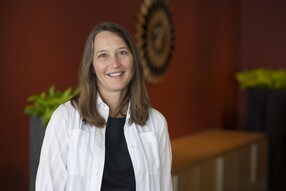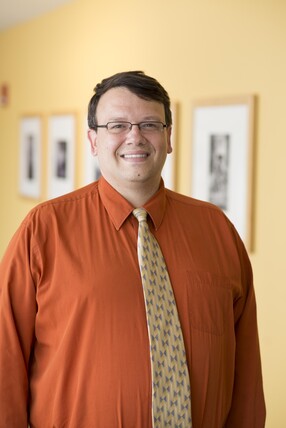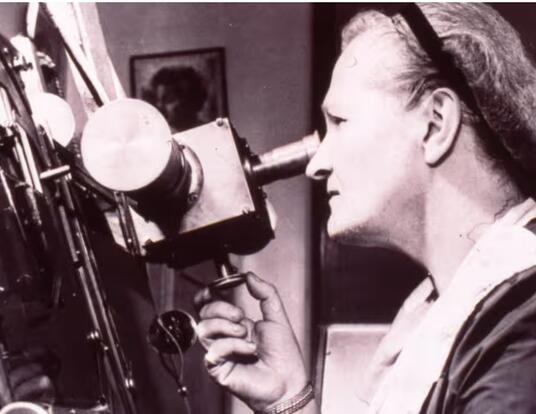Tireless Advocates
GSAS financial aid officers help students navigate the challenges of funding graduate school

For 26 years, GSAS students have come to Assistant Director of Financial Aid & Senior Admissions Officer Judith Mehrmann for help in times of trouble. Some have lost a parent or are homeless after a fire destroyed their apartment building. Some have received a dire diagnosis. Whatever the crisis may be, Mehrmann listens sympathetically and works with the student on a plan to deal with its financial impact. Often, even a little extra funding can ease the burden and make the difference between graduation and withdrawal.

“When you see someone who's gone through this terrible circumstance but made it and crossed the stage at Commencement, there's nothing more incredible than that,” she says. “Quite a few times, people have sought me out, gave me a big hug, and said, ‘Thank you. I don't know that I could have done this without you.’ That’s what gets me out of bed in the morning.”
Mehrmann is not alone. The whole team at the GSAS Office of Financial Aid has a passion for working with students, helping them find funding options for tuition, research, living, and other expenses during their time at Harvard. And like Mehrmann, the School’s financial aid officers look forward to seeing those they serve walk across the stage of Sanders Theatre, degree in hand, on Commencement Day.
When you see someone who's gone through this terrible circumstance but made it and crossed the stage at Commencement, there's nothing more incredible than that.
–Judith Mehrmann
Improvement and Challenges
Institutional financial support for PhD study is a relatively recent development in GSAS’s 150-year history. Before World War II, students who needed funding had mostly to rely on support from external sources, such as family wealth, private foundations, or generous benefactors. After the war, funding from the federal GI Bill fostered a surge in enrollment.
By the late 1960s, however, both public and private sources of funding were running out. GSAS instituted a need-based financial aid policy, with the idea that all students should have the resources to complete their education. At the end of the 20th century, however, the School began awarding aid by academic cohort, in order to distribute resources more evenly among all students.
“My first year at GSAS was 1999,” remembers Lisa Simpson, assistant director of financial aid & senior admissions officer, humanities and social sciences. “It was the first year that we had the standard humanities and social sciences merit-based financial aid package. It provided four years of tuition and two years of stipend. In the time that I've been here, that package has improved time and again.”
Today, financial aid packages vary by field, but all have one thing in common—they are larger than those of a generation ago. “The packages today are quite robust compared to those in the past,” says Simpson.
The strength of the School’s financial aid program doesn’t mean that students don’t face challenges. For instance, time to degree may differ widely. Some students may need only five or six years to get their PhD; some, seven or eight. As adults with adult lives—sometimes including families of their own—students may also have increased financial responsibilities. As a result, some can experience a funding shortfall. When they do, the financial aid team works with them on ways to bridge the gap—an effort that’s become more challenging in recent years.
“There was a time where we had more aid available for students from private foundations and grant-makers external to Harvard,” Simpson says. “That seems to have dried up. And our students can struggle to fill the gaps in funding.”
Financial aid officers say that there is one challenge that all GSAS students have to face, regardless of their program: the cost of living in the Boston area.
“Greater Boston is an expensive place to be,” Mehrmann says. “The cost of living keeps rising, and it’s harder and harder for students to find an affordable place to live, even with roommates. And many of our students are at an age where they feel like they’re done with ‘dormitory living’ and need their own space—particularly those who are married and have children.”
In addition to assisting students in their search for grants and other sources of funding, financial aid officers can offer loans. But Simpson says that current students are more averse to adding to their educational debt than their predecessors. “Nobody wants to take a loan, whether it's a federal or private loan unless they absolutely have to,” Simpson says. “That said, loans are sometimes the only option if a student has a gap that is unfilled by competitive grant funding.”
Getting Students Home
The global COVID-19 pandemic presented unprecedented challenges for GSAS students—and the financial aid staff charged with helping them. Matt Wallace, assistant director of financial aid and senior admissions officer, interfaculty, remembers working long hours for months on end to shepherd anxious students through the myriad problems they faced.

“In March 2020, when campus shut down, many of our students were scattered across the globe doing research,” he says. “There was a huge process of getting them home safe and healthy. That meant arguing for emergency hardship funding for students who were in a situation that they couldn't get out of on their own. That prompted the School to create the Emergency Support Initiative, which supported students whose academic progress had been impacted by the pandemic. I feel as proud of that work as anything I’ve done at GSAS.”
While the pandemic is (hopefully) receding, students still face big challenges. The improvement in the aid packages that GSAS offers has brought in new students from more diverse backgrounds. Many of them may have few financial resources of their own to draw on if their time to degree exceeds five or six years and they have to bridge a gap in funding. When they face that challenge, students will find the team at the Office of Financial Aid there to help in any way they can.
In March 2020, when [COVID-19 hit] campus, many of our students were scattered across the globe doing research. There was a huge process of getting them home safe and healthy.
–Matt Wallace
“We're all in this line of work because we want to help students,” Lisa Simpson says. “We work tirelessly to advocate for them, whether that means writing a letter to request emergency funding from various offices here at Harvard or talking to program administrators to see if there’s anything their department can do to fill the financial gaps. We also interact with student services on a regular basis to help develop plans for students with difficult issues that go beyond financial aid. We all want students to achieve their goals. We all look forward to that moment when we can see the people we work with don their caps and gowns and put that hood over their shoulders.”
Photos by Tony Rinaldo; Banner courtesy of Shutterstock
Get the Latest Updates
Join Our Newsletter
Subscribe to Colloquy Podcast
Simplecast





